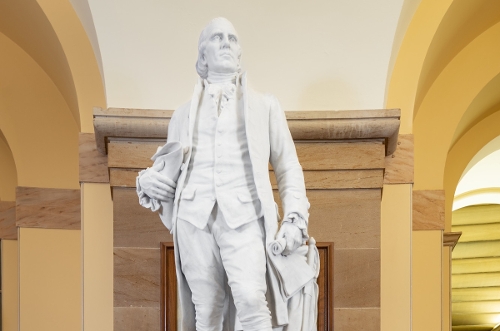
Caesar Rodney: A Founding Delegate Who Helped Start America's Road to Freedom
Celebrating the 250th Anniversary of the First Continental Congress
By Charlie Copeland, Director
Center for Economic & Fiscal Policy
October 31, 2024
(Picture source: Caesar Rodney's statue from the National Statuary Hall Collection)
September 5, 2024, marked the 250th anniversary of the start of the First Continental Congress, where delegates from 12 of the 13 colonies met in Carpenter's Hall in Philadelphia, PA. They gathered in response to the 1774 four Intolerable (Coercive) Acts, a series of harsh measures imposed by the British government. These Acts were passed after the repeal of the 1765 Sugar Act and Stamp Acts due to active agitation by the American colonies.
With Caesar Rodney's participation - marking his debut on the colonial stage - the First Continental Congress adopted an agreement to ban all trade with Britain, explicitly banning the slave trade.
Caesar Rodney's Debut- The Stamp Act Congress
During the 1765 Stamp Act agitation, 37-year-old Delaware political leader Caesar Rodney and even younger Thomas McKean were tasked by John Dickinson and others to represent Delaware at the Stamp Act Congress in New York City, NY. Rodney was an active participant and assisted in writing the "Declaration of Grievances" - a letter sent to the King on behalf of the Colonies. Rodney later wrote that it was "one of the most Difficult Tasks ... yet Undertaken, as We had Carefully to avoid any Infringement of the prerogative of the Crown[.]"
Following the efforts of the Stamp Act Congress in the spring of 1766, the King and Parliament repealed the Stamp Act. Almost simultaneously, however, they passed the "Declaratory Act," which asserted Britain's right to "bind the colonies and People of America... in all cases whatsoever." This declaration that the Colonies had no right to self-government set up the next major conflict between Britain and the Colonies.
Caesar Rodney Leads Delaware Toward the First Continental Congress
In May 1773, Parliament passed the Tea Act in a pique of anger at continued colonial intransigence. This Act led directly to the Boston Tea Party, where a young forebearer of mine, Joseph Lovering, assisted in destroying a tea cargo by dumping it into the Boston Harbor. In response, the British Parliament closed Boston Harbor and passed the four Intolerable Acts.
By this time, Caesar Rodney was the Speaker of the Delaware General Assembly. Rodney, along with George Read and John McKinly, supported a colony-wide non-import/export agreement and a meeting of a Continental Congress. Rodney expressed in the Delaware letter of support that Delaware is part of the United Colonies, "and an Attack on one" affects all.
Caesar Rodney - The First Continental Congress - A Leader for Freedom
The First Continental Congress met in Philadelphia, PA, and on September 7th, Caesar Rodney was assigned to the committee established to write the report on the "Rights of the Colonies." The report would define an infringement of these "rights" and propose a means of relief. The committee debated the source of human rights, whether they came from "Natural Rights" or "English Law."
On October 20, 1774, the Congress adopted the "Continental Association," which pledged the Colonies to boycott British merchants and ban all ships engaged in the slave trade. The document was earth-shattering as Rodney's committee and Rodney himself began the first small steps towards confronting the evils of slavery and promoting individual rights decades before any other Country started to look at slavery.
Upon receiving the news from the Colonies, King George declared that the "northern colonies are in a state of rebellion." The die was cast for future trouble between Britain and the Colonies.
The Forgotten Continental Congress
While largely forgotten today, the Articles of Association (Continental Association) were extremely important in shaping the early identity of our nation. In his first inaugural address, Abraham Lincoln references them as the actual formational document of the United States:
"The Union is much older than the Constitution. It was formed, in fact, by the Articles of Association in 1774. It was matured and continued by the Declaration of Independence in 1776. It was further matured, and the faith of all the then thirteen States expressly plighted and engaged that it should be perpetual, by the Articles of Confederation in 1778. And finally, in 1787, one of the declared objects for ordaining and establishing the Constitution was 'to form a more perfect Union.'"
Caesar Rodney's Legacy
Caesar Rodney had begun to make his mark in history, and the 250th anniversary of the First Continental Congress is an excellent reason to celebrate his and Delaware's role in promoting freedom and independence.
(Additional Source: Scott, Jane Harrington. A Gentleman as well as a Whig: Caesar Rodney and the American Revolution. Associated University Presses, 2000. Chapter 9, "The First Continental Congress.")